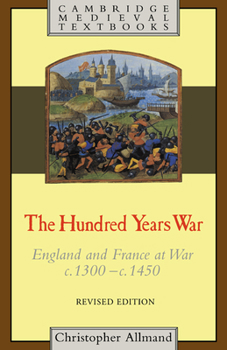The Hundred Years War: England and France at War C.1300-C.1450
(Part of the Cambridge Medieval Textbooks Series)
Select Format
Select Condition 
Book Overview
This is a comparative study of how the societies of late-medieval England and France reacted to the long period of conflict between them commonly known as the Hundred Years War. Beginning with an... This description may be from another edition of this product.
Format:Paperback
Language:English
ISBN:0521319234
ISBN13:9780521319232
Release Date:January 2008
Publisher:Cambridge University Press
Length:232 Pages
Weight:0.70 lbs.
Dimensions:0.7" x 5.5" x 8.4"
Customer Reviews
3 ratings
A lot of knowledge about more than just the battles
Published by Thriftbooks.com User , 15 years ago
I was looking for a text book, as opposed to a novel, about the Hundred Years War between England and France. Allmand's book is full of information about how the war affected the transition from middle ages feudalism to nation states, more centralized government (ugh!), and values at the time. If you want detailed battle descriptions, this is not the book to read. If you want to learn a lot about the period, this is it. The book is both factual and insightful.
A Very Long War
Published by Thriftbooks.com User , 17 years ago
Read this for graduate history course in medieval history. Christopher Allmand, is an excellent historian who tells the story of the Hundred Years War in a very succinct manner. End of 14th C England emerges with a real national identity. Edward III 1327-77. An example, 1362 Edward III has official records kept in English, not French, moving away from Norman influence, this is a defining moment. This helps English literature to flourish. A political identity is being built as well. Edward III (13 November 1312 - 21 June 1377) was one of the most successful English monarchs of the Middle Ages. He remained on the throne for 50 years; no English monarch had reigned as long since Henry III, and none would until George III. Having restored royal authority after the disastrous reign of his father, Edward II, he went on to transform England into the most efficient military power in Europe. To a large extent, Edward III can be credited with the birth of the English nation. He pushes idea of 100 Year's war his reign saw vital developments in legislature and government--in particular the evolution of the English parliament--as well as the ravaging of the Black Death. Where 1/3 population dies which also causes him to scale back on 100 Year's war. Parliament as a representative institution was already well established by the time of Edward III, but the reign was nevertheless central to its development. During this period membership in the English baronage, formerly a somewhat indistinct group, became restricted to those who received a personal summons to parliament. This happened as parliament gradually developed into a bicameral institution. Yet it was not in the House of Lords, but in the House of Commons that the greatest changes took place. The widening of political power can be seen in the crisis of the Good Parliament, where the Commons for the first time--albeit with noble support--was responsible for precipitating a political crisis. In the process, both the procedure of impeachment and the office of the Speaker were created. Even though the political gains were of only temporary duration, this parliament represented a watershed in English political history. The political influence of the Commons originally lay in its right to grant taxes. The financial demands of the Hundred Years' War were enormous, and the king and his ministers tried different methods of covering the expenses. The king had a steady income from crown lands, and could also take up substantial loans from Italian and domestic financiers. To finance warfare on Edward III's scale, however, the king had to resort to taxation of his subjects. Taxation took two primary forms: levy and customs. The levy was a grant of a proportion of all moveable property, normally a tenth for towns and a fifteenth for farmland. This could produce large sums of money, but each such levy had to be approved by parliament, and the king had to prove the necessity. The customs therefore prov
An excellent analysis of English/French medieval rivalry
Published by Thriftbooks.com User , 23 years ago
Christopher Allmand has taken a very long timeframe of medieval rivalry between the two great powers of the time, England and France and has done an excellent job of describing the begining, preperation and culmination of a very Bloody and Nasty war between England and France. These two great nations were always antagonistic with each other and had finally reached a "boiling point" around 1300, thus declaring official and unofficial war with each other that did not end until the beginning of the 19th century. Allmand doesn't use schollarly details to confuse the reader, he writes in a good prose and is easy to understand the background of the French and English Kings who honestly did not like each other, even though in most circumstances they were related to each other by blood or marriage. This book also gives analysis of how the war between these two nations affected the innocent victims such as the villiagers, serfs and even nobility. This was a war of gaining territory, sacking villiages in the name of the King, very nasty and terrible battles and political status in Medieval Europe. I highly recommend this book to all who want to know about how the rivalry between England and France developed and how the rivalry led to war that made it not just a hundred year war, but a war that lasted well over 400 years.




